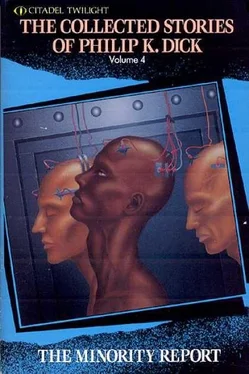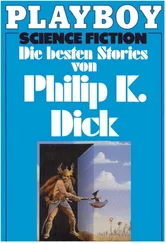The newspaper was warning Earth about Dietrich, and Hood could not help feeling grim relish. The Times had not been set up to serve merely the occupying hierarchy. It served everyone, including those Dietrich intended to try. Each step of the police activity would no doubt be reported in full detail. Dietrich, who liked to work in anonymity, would not enjoy this. But the authority to maintain the newspaper belonged to Hood.
And he did not intend to shut it off.
One item on the first page of the paper attracted his further notice; he read it, frowning and a little uneasy.
CEMOLI BACKERS RIOT IN UPSTATE NEW YORK
Supporters of Benny Cemoli, gathered in the familiar tent cities associated with the colorful political figure, clashed with local citizens armed with hammers, shovels, and boards, both sides claiming victory in the two-hour melee which left twenty injured and a dozen hospitalized in hastily-erected first aid stations. Cemoli, garbed as always in his toga-style red robes, visited the injured, evidently in good spirits, joking and telling his supporters that "it won't be long now" an evident reference to the organization's boast that it would march on New York City in the near future to establish what Cemoli deems "social justice and true equality for the first time in world history." It should be recalled that prior to his imprisonment at San Quentin -
Flipping a switch on his intercom system, Hood said, "Fletcher, check into activities up in the north of the county. Find out about some sort of a political mob gathering there."
Fletcher's voice came back. "I have a copy of the Times, too, sir. I see the item about this Cemoli agitator. There's a ship on the way up there right now; should have a report within ten minutes." Fletcher paused. "Do you think – it'll be necessary to bring in any of Dietrich's people?"
"Let's hope not," Hood said shortly.
Half an hour later the CURB ship, through Fletcher, made its report.
Puzzled, Hood asked that it be repeated. But there was no mistake. The CURB field team had investigated thoroughly. They had found no sign whatsoever of any tent city or any group gathering. And citizens in the area whom they had interrogated had never heard of anyone named "Cemoli." And there was no sign of any scuffle having taken place, no first aid stations, no injured persons. Only the peaceful, semi-rural countryside.
Baffled, Hood read the item in the Times once more. There it was, in black and white, on the front page, along with the news about the landing of the CURB armada. What did it mean?
He did not like it at all.
Had it been a mistake to revive the great, old, damaged homeostatic newspaper?
From a sound sleep that night Hood was awakened by a clanging from far beneath the ground, an urgent racket that grew louder and louder as he sat up in bed, blinking and confused. Machinery roared. He heard the heavy rumbling movement as automatic circuits fitted into place, responding to instructions emanating from within the closed system itself.
"Sir," Fletcher was saying from the darkness. A light came on as Fletcher located the temporary overhead fixture. "I thought I should come in and wake you. Sorry, Mr. Hood."
"I'm awake," Hood muttered, rising from the bed and putting on his robe and slippers. "What's it doing?"
Fletcher said, "It's printing an extra."
Sitting up, smoothing her tousled blonde hair back, Joan said, "Good Lord. What about?" Wide-eyed, she looked from her husband to Fletcher.
"We'll have to bring in the local authorities," Hood said. "Confer with them." He had an intuition as to the nature of the extra roaring through the presses at this moment. "Get that LeConte, the politico who met us on our arrival. Wake him up and fly him here immediately. We need him."
It took almost an hour to obtain the presence of the haughty, ceremonious local potentate and his staff member. The two of them in their elaborate uniforms at last put in an appearance at Hood's office, both of them indignant. They faced Hood silently, waiting to hear what he wanted.
In his bathrobe and slippers Hood sat at his desk, a copy of the Times' extra before him; he was reading it once more as LeConte and his man entered.
NEW YORK POLICE REPORT CEMOLI LEGIONS
ON MOVE TOWARD CITY,
BARRICADES ERECTED, NATIONAL GUARD ALERTED
He turned the paper, showing the headlines to the two Earthmen. "Who is this man?" he said.
After a moment LeConte said, "I – don't know."
Hood said, "Come on, Mr. LeConte."
"Let me read the article," LeConte said nervously. He scanned it in haste; his hands trembled as he held the newspaper. "Interesting," he said at last. "But I can't tell you a thing. It's news to me. You must understand that our communications have been sparse, since the Misfortune, and it's entirely possible that a political movement could spring up without our -"
"Please," Hood said. "Don't make yourself absurd."
Flushing, LeConte stammered, "I'm doing the best I can, summoned out of my bed in the middle of the night."
There was a stir, and through the office doorway came the rapidly-moving figure of Otto Dietrich, looking grim. "Hood," he said without preamble, "there's a Times kiosk near my headquarters. It just posted this." He held up a copy of the extra. "The damn thing is running this off and distributing it throughout the world, isn't it? However, we have crack teams up in that area and they report absolutely nothing, no road blocks, no militia-style troops on the move, no activity of any sort."
"I know," Hood said. He felt weary. And still, from beneath them, the deep rumble continued, the newspaper printing its extra, informing the world of the march by Benny Cemoli's supporters on New York City – a fantasy march, evidently, a product manufactured entirely within the cephalon of the newspaper itself. "Shut it off," Dietrich said. Hood shook his head.
"No. I want to know more."
"That's no reason," Dietrich said. "Obviously, it's defective. Very seriously damaged, not working properly. You'll have to search elsewhere for your world-wide propaganda network." He tossed the newspaper down on Hood's desk.
To LeConte, Hood said, "Was Benny Cemoli active before the war?" There was silence. Both LeConte and his assistant Mr. Fall were pale and tense; they faced him tight-lipped, glancing at each other.
"I am not much for police matters," Hood said to Dietrich, "but I think you could reasonably step in here."
Dietrich, understanding, said, "I agree. You two men are under arrest. Unless you feel inclined to talk a little more freely about this agitator in the red toga." He nodded to two of his police, who stood by the office doorway; they stepped obediently forward.
As the two policemen came up to him, LeConte said, "Come to think of it, there was such a person. But – he was very obscure."
"Before the war?" Hood asked.
"Yes." LeConte nodded slowly. "He was a joke. As I recall, and it's difficult… a fat, ignorant clown from some backwoods area. He had a little radio station or something over which he broadcast. He peddled some sort of anti-radiation box which you installed in your house, and it made you safe from bomb-test fallout."
Now his staff member Mr. Fall said, "I remember. He even ran for the UN senate. But he was defeated, naturally."
"And that was the last of him?" Hood asked.
"Oh yes," LeConte said. "He died of Asian flu soon after. He's been dead for fifteen years."
In a helicopter, Hood flew slowly above the terrain depicted in the Times articles, seeing for himself that there was no sign of political activity. He did not feel really assured until he had seen with his own eyes that the newspaper had lost contact with actual events. The reality of the situation did not coincide with the Times' articles in any way; that was obvious. And yet – the homeostatic system continued on.
Читать дальше










